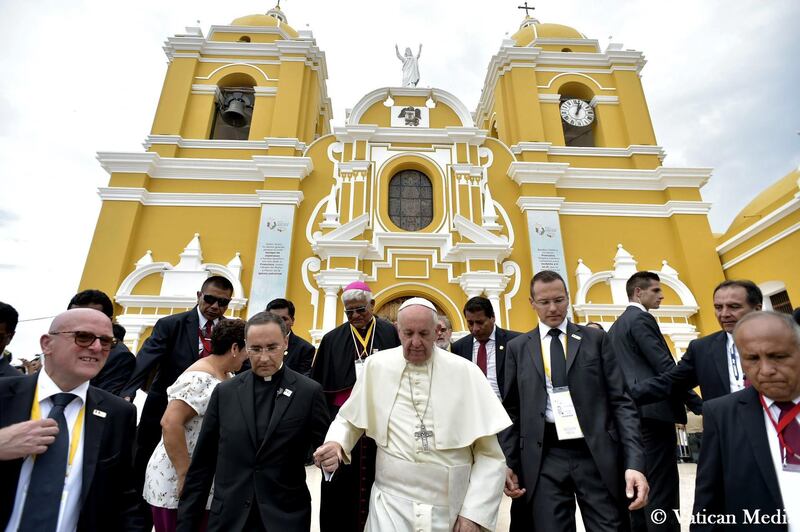Pope Francis on Saturday urged Latin America's faithful to fight rampant violence against women, including murder.
"I wish to invite you to combat a plague across our Latin American region: the numerous cases of violent crimes against women, from beatings to rape to murder," the visiting pontiff told thousands in Trujillo's main colonial-era square.
Half of the 25 countries with the greatest number of murders of women are in Latin America, according to UN Women.
In Argentina, the pope's homeland, there were at least 254 murders of women in 2016 that authorities think were gender-related - this sparked the online campaign #NotOneMore murder.
"There are so many cases of violence that stay silenced behind so many walls," Francis said, arousing cheers from the crowd. "I'm calling on you to fight against this source of suffering including legislation and a culture that rejects every type of violence."
The northwestern city Trujillo is still struggling to rebuild after deadly devastating floods one year ago.
More than 130 people were killed across Peru between January and April 2017 in heavy rains, floods and landslides fueled by the El Nino weather phenomenon, which also left at least 300,000 homeless. Hardest-hit was Peru's northern coastal region.
Pope Francis said that many families still could not rebuild their homes after the floods - then warned of the "storms" of organised crime.
The high crime rate means fewer educational and work opportunities, preventing young people "from building a future with dignity," Francis said.
_______________
Read more:
Pope Francis meets church sex abuse survivors in Chile
Pope's visit to Chile mired by memories of Church's murky past
Al Azhar's imam meets pope, vows to fight terrorism
_______________
The mass took place on a stretch of beach in Huanchaco, a town in Trujillo some 560 kilometers north of Lima. Huanchaco is popular with surfers and known for its distinctive reed watercraft known as "caballitos de totora."
The pope then boarded his Popemobile to visit Trujillo's impoverished "Buenos Aires" neighborhood, which was especially hard hit by last April's flooding.
"We will see if the pope brings along some blessings. And if we can recover completely from everything lost in the floods. We need him to bring some mercy," said local resident Lidia Garcia.
Francis was accompanied by Peru's president, Pedro Pablo Kuczynski.
The visit is a change of pace after a politically charged first day in the South American country where the pope railed against "great business interests" for endangering the Amazon and its indigenous people. He also lashed out at corruption in politics.
"There is so much damage done by this... thing that infects everything," the pope said. "And it's always the poorest and the environment that get the short end of the stick."
On Friday, he sounded a stark warning about the future of the rainforest and tribe members, saying they had "never been so threatened."
Bare-chested tribesmen, their bodies painted and their heads crowned with colorful feathers, danced and sang for the pope when he arrived in the Peruvian city of Puerto Maldonado.
Thousands of indigenous people had traveled to meet the pontiff from throughout the Amazon basin region of Peru, Brazil and Bolivia.
Pope Francis, 81, arrived Thursday afternoon in Peru, the second and last leg of a week-long South American visit.
During the first part of his visit, in Chile, Francis highlighted the plight of vulnerable immigrants, offered an apology to victims of sexual abuse by Catholic priests, prayed with survivors of Augusto Pinochet's brutal dictatorship, and called for protection of Chile's persecuted indigenous people.






